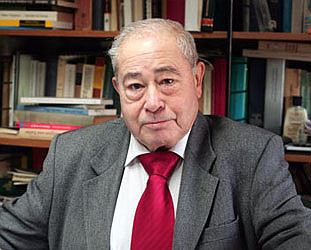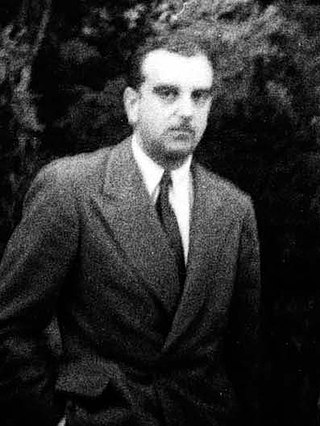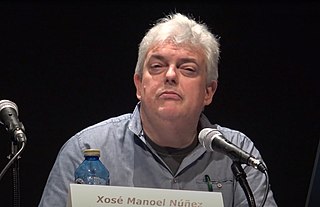
The Residencia de Estudiantes, literally the "Student Residence", is a centre of Spanish cultural life in Madrid. The Residence was founded to provide accommodation for students along the lines of classic colleges at Bologna, Salamanca, Cambridge or Oxford. It became established as a cultural institution that helped foster and create the intellectual environment of Spain's brightest young thinkers, writers, and artists. The students there included Salvador Dalí, Luis Buñuel and Federico García Lorca. Distinguished guests and speakers included Marie Curie, Albert Einstein, Juan Ramón Jiménez or Rafael Alberti.
Juan José Linz Storch de Gracia was a Spanish sociologist and political scientist specializing in comparative politics. He was Sterling Professor Emeritus of Sociology and Political Science at Yale University and an honorary member of the Scientific Council at the Juan March Institute. He is best known for his work on authoritarian political regimes and democratization.
Manuel García Pelayo, prominent Spanish political scientist and jurist. He was the founder of the modern Department of Political Science of the Central University of Venezuela and was elected President of the Constitutional Court of Spain in 1980.
The University of Granada is a public university located in the city of Granada, Spain, and founded in 1531 by Emperor Charles V. With more than 60,000 students, it is the fourth largest university in Spain. Apart from the city of Granada, UGR also has campuses in Ceuta and Melilla.

Joaquín Ruiz-Giménez Cortés was a Spanish politician and jurist. He was minister of Education under Franco (1951-1955) but he drifted apart from the Francoist State since 1956 and, adopting a Christian Democrat position, steadily started to promote a quiet transition to democracy, especially through Cuadernos para el Diálogo magazine. He was considered one of the most relevant figures of the moderate inner opposition to Francoism. Failing to play a relevant role during the 1977 democratic elections, he was later elected as the first Spanish Ombudsman.

The Centre for Political and Constitutional Studies, previously known as the Institute for Political Studies, is an autonomous agency associated with the Ministry for the Presidency of Spain.
The Moderate Party or Moderate Liberal Party was one of the two Spanish political parties that contended for power during the reign of Isabel II. Like the opposing Progressive Party, it characterised itself as liberal and dynasticist; both parties supported Isabel against the claims of the Carlists.
Bartolomé Clavero Salvador was a Spanish jurist and historian, specialized in legal history.

Dalmacio Negro Pavón is a Spanish university professor and author, member of the Spanish Royal Academy of Moral and Social Sciences.

Luis Díez del Corral y Pedruzo was a Spanish jurist, writer and political scientist. He was legal counsel and a deputy in the Spanish Cortes from 1943–49, during the first legislative sessions of the Franco Period and was the chief of the "Section for Corporate and Social Management" of the Institute for Political Studies.
Spanish Alternative is a far-right political party in Spain. It describes itself as "social Christian and cross-sectional". Its Secretary General is the lawyer and businessman Rafael López-Diéguez, former member of the far-right New Force, active formation during the Transition and managed by his father-in-law, the historic leader Blas Piñar, who was named honorary president of AES, a post which he held until his death in January 2014.

The Spanish National Union was a conservative and traditionalist political party in Spain.

Centro de Estudios Públicos (CEP) is a non-profit Chilean think tank founded in 1980. Its stated mission is to “contribute to the development of a free and democratic society” through: 1) the analysis and dissemination of philosophical, political, social and economic problems of interest to Chilean society; 2) the study, discussion and design of public policies; and 3) the promotion of institutions that support and enable the existence of a constitutional and democratic order. CEP contributes to the public debate through its seminars, the policy brief Puntos de Referencia, the journal, Estudios Públicos which has appeared continuously since 1980, the publication of books and various research studies, as well as social surveys, which have been conducted since 1987. CEP has become a household name for political, academic, and intellectual debate.

Maurism was a conservative political movement that bloomed in Spain from 1913 around the political figure of Antonio Maura after a schism in the Conservative Party between idóneos and mauristas ('maurists'). Its development took place in a period of crisis for the dynastic parties of the Spanish Restoration regime. The movement, which fragmented in several factions in the 1920s, has been portrayed as a precursor of the Spanish radical right.

Fernando Guillén Martínez (1925–1975) was a Colombian researcher, journalist, historian, sociologist and essayist.

Raul Jimenez Tellado, known professionally as Raul Jimenez, is a cosmologist and theoretical physicist and currently the ICREA Professor of Cosmology at the University of Barcelona. His research interests include the origin and evolution of the Universe, large-scale structure, dark matter, dark energy, inflation, the cosmic microwave background, statistics and Bayesian inference.

José María "Txema" Portillo Valdés is a Spanish historian, professor of Contemporary History at the University of the Basque Country. He is an expert in the Spanish constitutional history.

Javier Moreno Luzón is a Spanish historian, professor of the History of Thought and Social and Political Movements at the Complutense University of Madrid. He is an expert in the political history of Restoration Spain.

Xosé Manoel Núñez Seixas is a Spanish historian who specializes in nationalism studies, the cultural history of war and violence, and migration studies.
Manuel B. García Álvarez is a Spanish jurist and emeritus university professor, of the department of Constitutional Law of the University of León. He was the first Ombudsman of Castile and León between 1995 and 2005.













